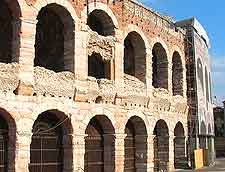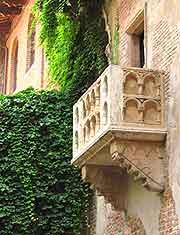Verona History Facts and Timeline
(Verona, Veneto, Italy)

It is easy to see why Verona became such a strategic settlement. Located on the banks of the River Adige, at a point where it is easy to cross from one side to the other, it is also surrounded by hills.
In 89 BC, the Romans created a colony in Verona. They were quick to strengthen its defences and the town grew rapidly at this time in its history. In fact, it is thought to have been considered as a miniature version of
Rome.
In its heyday, Verona boasted all the features of an important Roman city, including an arena, which dates to around the 1st century BC and can still be seen today. Unfortunately, the fall of the Roman Empire in the 5th century AD left Verona in a vulnerable state. Without adequate military protection, it was left open to groups of invading Barbarians, who plundered anything that the Romans had left behind.
Medieval History
As was the case for all Italian cities, life in medieval Verona was far from simple. Fierce internal rivalry led to political instability and frequent changes of ruler. Finally, around 1260, a powerful local family known as the della Scalas rose to prominence and Verona blossomed under their influence. In particular, they seemed to have had a great love for the arts. In fact, one member of this illustrious family, known as Cangrande I, was the patron of the famous Italian writer Dante.
The della Scala family favoured displays of their wealth and power - hence, many of the city's grandest buildings date to this period in its history, including the impressive Castelvecchio. The legend of Romeo and Juliet also has its origins in the city at this time.

From the Renaissance to the Present Day
In 1405, during the Renaissance, Verona was made part of the Venetian Republic. The city became the home of wealthy merchants and the nobility. They built palaces that reflected their prosperity and churches in which they could pray. Verona placed itself at the very heart of all things cultural and artistic. It also enjoyed a measure of economic success.
The political status quo was broken by French soldiers under Napoleon, who came and occupied the city in 1796. Then, in 1814, Verona was annexed by the Habsburg Empire. In the 19th century, the city served as a defensive stronghold. It was a key part in the 'Quadrilateral', along with Legnano, Peschiera and Mantua. Finally, in 1866, Verona became a part of the Kingdom of Italy.
In World War Two, Verona came under heavy attack from Allied bombers. It was further devastated by German forces when they retreated in 1945. Of note, the city won an award for the role it played in the partisan movement.
In recent years, Verona has built on its popularity as a busy tourist destination and the city now ranks as a significant UNESCO World Heritage Site.
 It is easy to see why Verona became such a strategic settlement. Located on the banks of the River Adige, at a point where it is easy to cross from one side to the other, it is also surrounded by hills.
It is easy to see why Verona became such a strategic settlement. Located on the banks of the River Adige, at a point where it is easy to cross from one side to the other, it is also surrounded by hills.